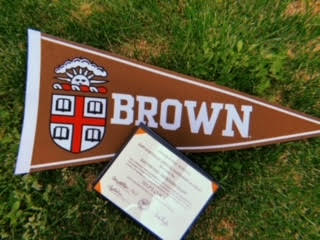First-Generation Guilt: A Losing Game
- Becca
- May 2, 2023
- 4 min read
Updated: Sep 5, 2023
Written by Becca E. (Class of 2024, Brown University)
Tonight, my roommate's dad is in town and he is taking us to a fancy restaurant for dinner where an entree starts at $45. Tonight, my own dad is on the road, delivering others' dinner door to door, striving for that extra $20 to his day's wages. After, he will get home late and microwave the dinner he couldn't show up for.
My parents left family, friends and comfortable jobs in Mongolia when they moved to America ,when I was 15, for me and my sibling's futures. I carried this burden on my shoulders throughout high school and made getting into college my singular focus. When I was accepted into Brown University, an Ivy League institution, I felt like I made my parents' American dream come true.
From then on, I lived in cities my parents have never visited, such as New York, Washington, D.C. and Boston. Thanks to the friends I met at Brown, I have stayed at beach homes my mom has only seen in her architectural magazines. I have held an internship in Congress and I have paved the way for higher education for my younger siblings.
Each year, I visit home less and less due to internships, conferences and recruiting, in an effort to stay ahead of other kids where a career out of college will come easier. Every time I go home, my younger siblings have grown 5 inches more and I feel as if I am missing out on their childhood. When I left them to go to college, my parents did not just lose a daughter, but a translator, a babysitter, an advocate and an advisor.
I should be cherishing these experiences. I worked hard for them throughout my high school years. But all it leaves me is a gnawing twist in my stomach. A twist that only tightens every time I visit back home, like a rope that ties me to my roots.
Even though both of my parents have bachelor's degrees, they never went to college in the United States, so I am the first from my family at every stepping stone. The more successful I become, the more I stray further from my parents. It gets harder to involve them in my life because everything is a brand new experience they have never had. I can't explain sports tailgating to them or ask for advice in pursuing a career in consulting like I can from my friend's parents.
Every year, I abstain from letting my parents know about parents weekend, knowing my mom would not understand all the English programming or worrying they would feel out of place in a sea of legacy parents. When the weekend inevitably rolled around, I saw other parents on campus and even if it was my own doing, their absence left me feeling like my parents didn't show up to see my performance at the school talent show.
I am an immigrant child who came from a city in Mongolia no one has ever heard of and I made my way to an Ivy League university. Isn't this the American Dream? Have I not achieved what my parents came to this country for? Then why do I feel like I am losing?
One-third of all college students in the United States are the first in their family to go to college. Almost 5 million of them are first- or second-generation immigrants. I am one of them. Nevertheless, this article has been one of the hardest pieces for me to write, even though I have written much longer academic papers.
The feeling of first-gen guilt is buried so deep inside of me that I have never even talked about it out loud before. I rarely talk about my parents' or my struggles with my closest college friends as they didn't have the same background. There are 5 million other students out there who are feeling the same. I am sure every student in Access Opportunity has felt the exact same way at one point or another.
First-generation college students are alway focused on surviving, getting to the next semester, the next job, the next sibling's college admissions, and trying to fit in with kids who do not understand us all while navigating an educational system that we were not prepared for. But the hardest aspects of being a first-generation college student can be the feeling of abandoning our parents, their way of life and our community. In fact, only 20% of students whose parents never went to college complete their college degrees compared to 60% of those who have at least one parent with a bachelor's degree.
It is time us first-generation students opened up and admitted our struggles to each other, to our families and to the world. It is time we admit how hard it is to be suddenly dropped into predominantly white institutions, where we must learn how to study for the first time in our lives due to previously attending schools that never challenged us to our full potential. Admit how hard it is to try to be a full-time student while also working to support our families. Admit how hard it is to not have a strong support system like legacy students when it comes to acquiring internships and post-grad jobs. Admit how hard it is to feel guilty about pursuing our dreams. Because once we do, we won't feel so alone anymore.
Admitting all of this, and talking about it, will allow us to relate to one another and develop supporting friendships. It will help our families learn about our lives and be more understanding of our struggles. We will admit to ourselves how much more baggage we have than our peers and stop trying to survive our way through it. We can finally start making changes and taking care of our emotional well-being. Then surviving can become thriving and your wins might finally feel guilt-free. When we admit, we can finally let our parents backstage to cheer us on.
Becca was one of Access Opportunity's Student Ambassadors throughout the 2022-23 school year. She worked on many different projects this year, but this essay represents her final work as an ambassador. To learn more about her, please visit her other blog post. We wish you luck on completing your final year at Brown next year, Becca!










